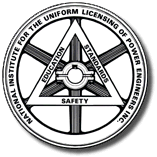National Institute for the Uniform Licensing of Power Engineers, Inc.
|

|
WHAT IS NIULPE?
The National Institute is a third party licensing agency that acts on a national level for power engineers and those associated with the profession. Registration is purely voluntary on the part of licensing agencies, etc. It is, however, the only formal structure through which a person in power engineering may establish formally, a level of national competence and national professional recognition. NIULPE is affiliated with the National Association of Power Engineers and will perform the following major functions:
- Establish and maintain uniform standards as to qualifications for power engineers.
- Promote safety in the operation of power generating equipment.
- Assist licensing agencies to determine the competence of power engineers through investigations and examinations which test the qualifications of voluntary candidates for licenses to be issued under the rules of NIULPE.
- Grant and issue commissions to the licensing agencies who apply and qualify.
- Maintain a registry of all licensing agencies meeting the requirements of NIULPE.
- Serve as a clearing house to facilitate reciprocity between all licensing agencies.
- Maintain a registry of all examiners who meet the requirements of NIULPE and are commissioned by NIULPE.
- Develop and keep current uniform terms and definitions, updating terminology and eliminating obsolete terms.
- Encourage the enforcement and compliance to all codes, laws, and acts assuring the protection of health, life and property,
i.e. Occupational Safety and Health Act of 1970, Public Law 91-596, and the accepted engineering practice standards in
appendices B and C in the Boca Basic Mechanical Code/1971, Air Pollution Control, Article II of the Boca Mechanical Code 1971.
- Publish a standard curriculum for education and guideline for study requirements.
- Publish a guideline for power equipment rating, automation, etc.
- Act as advisor to educational entities engaged in teaching power engineering and technology.
Back to Home
|
